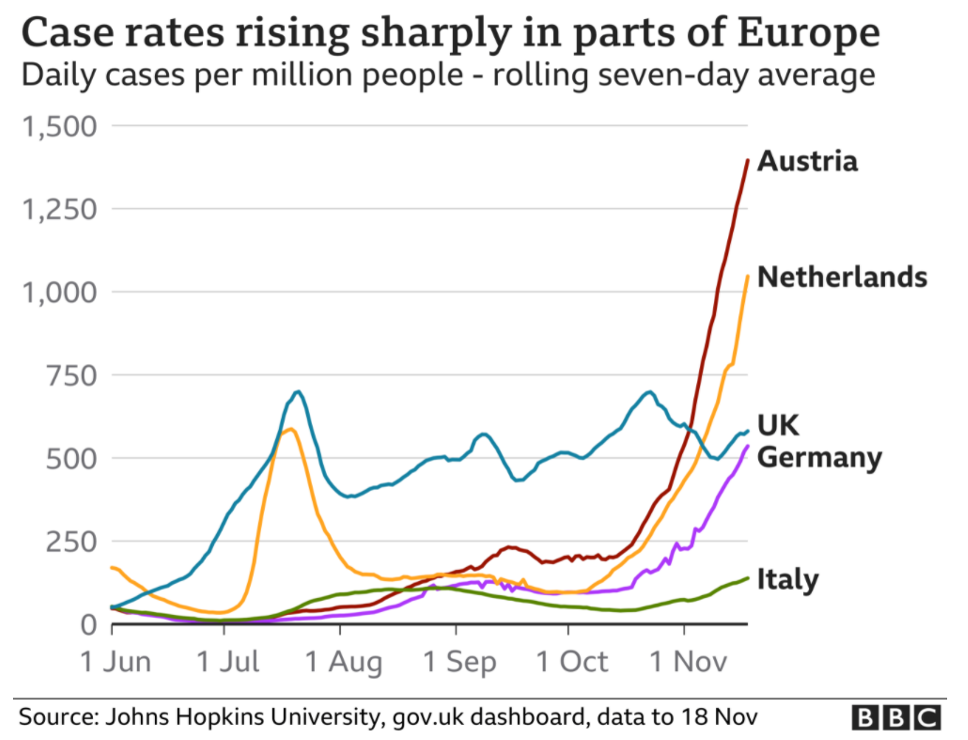Why Covid Restrictions in Austria Have Me Worried as an Investor, And What To Do About It

Austrian Chancellor Alexander Schallenberg has gotten serious about fighting surging Covid-19 cases and deaths in his country. Just days after announcing a stay-at-home order for the unvaccinated, he has switched tack and is instituting a nationwide lockdown, and will be mandating vaccination for the whole country by February of next year. As you might expect, markets around the world are responding to that, but how worrying should it be for U.S. investors?
The obvious answer to that question is “not very” but dig a bit deeper and a little more concern does come bubbling to the surface.
The argument as to why it means little comes down to the belief that there is virtually no chance of a return to restrictions that would have an economic impact here in America.
I am not from America originally, but I moved here long enough ago to understand that mandating vaccination in the U.S. is just not going to happen. Apart from anything else, the thought of the government maintaining the kind of health information database that would be needed for enforcement of such an order would horrify so many people that it would be politically a non-starter, never mind the mass civil disobedience that it would probably engender.
Nor is returning to a lockdown in a national sense on the cards here. The anti-mask and anti-vaccine advocates have already shown that freedom from such regulations is important to them, even if it means putting the lives of themselves and others at risk. Meanwhile, the vaccinated and mask wearing population are increasingly angry about restrictions being placed on their freedom because some people refuse to conform, and the “serves them right” attitude to hospitalizations and deaths among the unvaccinated is gaining ground. As with seemingly everything these days, it has become a heated and highly partisan debate, but the important thing is that neither side would be likely to obey a stay-at-home order, albeit for very different reasons. In that situation, even if some sort of U.S. lockdown were announced, it is hard to see it being observed.
Absent that, who cares if Austria closes for a while? After all, as Covid regained ground around the world this year, U.S. corporate profits and market indices have soared. Why should this time be any different?
All of that indicates that the Austrian problem and solution is not particularly relevant to American investors. Some obvious areas of the market such as international airlines will suffer a bit, but Austria, for all its history and beauty, is a country of around 9 million people. That isn’t enough to move the needle on profits for U.S. companies, so temporary disruption there shouldn’t have a lasting impact on the U.S. economy or markets.
And yet, this morning, we saw Dow futures indicating an opening a couple of hundred points below yesterday’s close and bond yields higher, together indicating a “risk off” move in markets. So, what has traders worried?
The potential problem is that once restrictions are imposed in one country, they may spread. Austria is not the only European country to have experienced resurgent Covid and, while a shutdown there would have only a limited impact, if other affected countries such as Germany and the Netherlands were to follow suit, things could get very ugly, very quickly:

Until recently, that would have been unthinkable but now, with elections having taken place in both countries earlier this year, governments with years of power ahead of them face a different dynamic. They can afford some short-term unpopularity if it means they will be able to point to long-term success a few years from now when, politically, it will really matter. Some may regard bringing up those political calculations in matters of life and death as cynical, but I prefer to see it as simple realism and, as I have said many times in the past, traders and investors must deal with what is, not what should be.
That is why Schallenberg’s announcement today has prompted a reaction in markets this morning, albeit a limited one, and it is also why I will be making some adjustments to my holdings when the market opens. I have a couple of small positions in international airlines that I will be closing out, and I will, for a short time, hedge my entire portfolio by buying something like SPXU, a 3x leveraged bear ETF.
That fund is designed to go up by 3x the amount that the S&P 500 falls, so if the index lost 5%, your investment would, in theory, show a 15% profit. It isn’t quite that simple because daily resets and a relatively high expense ratio of 0.93% reduce returns over longer periods, but it works for me as a short-term hedge to bring peace of mind should more turmoil hit. Hopefully, the measures in Austria will turn out to be a storm in a teacup and I will lose a small amount on SPXU. However, just in case the restrictions themselves become contagious, some defensive moves by investors right now seem to make sense.
Do you want more articles and analysis like this? If you are familiar with Martin’s work, you will know that he brings a unique perspective to markets and actionable ideas based on that perspective. In addition to writing here, Martin also writes a free newsletter with in-depth analysis and trade ideas focused on just one, long-time underperforming sector that is bouncing fast. To find out more and sign up for the free newsletter, just click here.
The views and opinions expressed herein are the views and opinions of the author and do not necessarily reflect those of Nasdaq, Inc.
